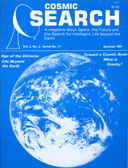![[NAAPO Logo]](../../Images/NAAPOsm.jpg) North American AstroPhysical Observatory (NAAPO)
|
|
Letters:
By: Editors
Much as I enjoy the company and personalities of other radio astronomers, I surely don't relish the idea of everybody being one of them! No, I think the mix of personalities and talents in our population will not change very much in the future, except that there will be a much smaller percentage of manual laborers. More to the point, I think the typical person will still not be an intellectual and will have the ambitions and desires of our era. A good life, adventure, a chance to raise the standard of work and living.
Such people will not want interstellar colonization when they consider the cost. Even if you have a good fusion reactor, which does go a long way towards making interstellar travel possible, the energy required is still enormous and could be used to much greater benefit right back home. The energy picture, and the relative benefits of employing the energy near home or in deep space do not change no matter what breakthroughs occur.
The only believeable reason I accept for interstellar colonization is chauvinism. Do They really embrace it, and launch their colonies despite the horrendous loss to Them? This is a question in galactic sociology, and even the most confident of the SETI people doesn't claim any skill at that subject, yet.
As to the question of whether radio waves are the best means of interstellar communication, well, we do know a lot more about physics and the universe than the scientists of the 19th century. We know enough of the very basic physics of the universe to conclude that radio waves are a very promising way to go, although everyone agrees that we should be alert for signs of life in other forms of radiation. It is very unlikely that there is some potential form of communication, some mysterious "Q-waves" which we do not know about. But not completely impossible. In any case, we should not defer the promising radio searches because of the remote possibility that Q-waves exist.
Dr. Drake's "In Which Klingons Become Chimeras" in the Winter 1981 issue contains a good summary of the argument advanced recently against the existence of extraterrestrials. However, the points he makes against the argument need qualification. It is not the absolute amount of energy a project will need but the percent of the total energy budget of a civilization which determines if a mission is impossible. In 1900 the total energy budget of the U.S. was not equal to the first stage of a Saturn 5 moon rocket. Sixty-nine years later the total energy available to the U.S. had grown to the point where a moon Mission was possible.
As to Dr. Drake's contention that intelligent beings will be logical, the only example we know, i.e. humanity, is not always logical. For example, in his article he links his opponent's argument with a "disease" and by giving that "disease" a name, "Star Trekitis," tends to identify the argument with the still slightly disreputable sub-culture of science-fiction.
The only way to decide between Dr. Drake's position and his opposition is to gather more data and this is the best argument for proceeding with all kinds of searches.
Mr. Boyle raises a very fundamental and provocative question which is of great interest in its own right, as well as in its importance in determining the best approaches to SETI. Is it the absolute or relative amounts of energy which will control a civilization's decisions about interstellar enterprises? Would that we knew something about this prime question of galactic sociology! Mr. Boyle believes that the relative amount of energy dominates decision making. Then we can speculate that sources of energy so copious will finally be developed that almost anything, even interstellar colonization, will be justified and attempted. I think this is true up to a certain level of energy supply, beyond which the absolute amount of energy required to do things will control decisions. At this stage, choices will be made between various appealing alternatives. As an analog, imagine a family so wealthy that they can travel anywhere they wish. I suspect that they may go to the Antarctic once, just to see what it is like, but from then on their resources will be expended in places such as Tahiti and Paris. Returning to the extraterrestrials, I think they may dabble in interstellar exploration, but will primarily turn to terraforming their own planetary system.
Mr. Boyle makes a very important point which every thinking person should draw from discussions like that above. We do not know enough to phyche [sic; "phyche" should be "psyche"] out the extraterrestrials. It is sheer folly to think that we can predict galactic sociology. What we need is data, as Mr. Boyle emphasizes. SETI, for now, is very much an experimental science. Even there we cannot by sure what is best. We should support any cost-effective approach to SETI which, even at the greatest stretch of the imagination, might find evidence of extraterrestrial life.
|
